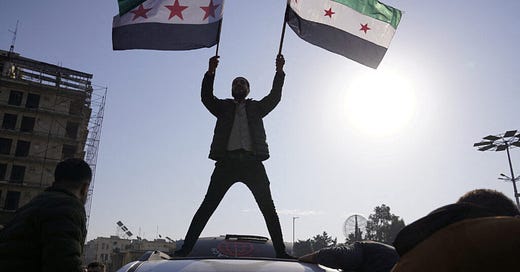Let Freedom Ring
The fall of Assad in Syria is a great moment in human history. But what does it mean for Syria and the region?
I’m Michael A. Cohen, and this is Truth and Consequences: A no-holds-barred look at the absurdities, hypocrisies, and surreality. If you were sent this email or are a free subscriber and would like to become a paid subscriber, you can sign up here.
If money is tight or you’re already up to eyeballs in subscriptions, here’s another idea — share this article. Email it to a friend (or even an enemy). Post it on Facebook, Twitter, or LinkedIn. Text or email it to your wife, husband, mother, father, brother, sister, or even your creepy second cousin who lives in Aleppo. Word of mouth is often the best way to build support for a creative endeavor, so if everyone here sends it to just one person … it would be much appreciated.
On Friday, a reader sent me a note asking for more reporting on international issues, and here at Truth and Consequences, when you ask … you receive.
Yesterday, I wrote a piece on the situation in Syria. You can read the whole thing here, but I’ll highlight a few key points.
Three key external factors and one major internal factor played a role in Assad’s demise.
Iran, Syria’s biggest regional benefactor, has been severely weakened since the October 7 attacks. It has withstood Israeli military strikes and watched its two main regional non-state proxies — Hizballah and Hamas diminished by Israeli military strikes. This situation made it more difficult for Iran to give Assad the support he needed as the rebels began their offensive.
Hizballah’s weakening by Israeli military strikes was a significant problem for Assad, as the group had, throughout much of the civil war, provided him with military resources and fighting men.
Finally, and perhaps most decisively, with Russia bogged down in Ukraine, Assad could no longer rely on Moscow’s direct military engagement in fighting the rebels, particularly Russia’s close air support that was crucial for Syria’s army.
But, as I note in the piece, “the most critical factor was internal: the slow-motion decay of the Assad regime. Massive corruption, economic stagnation, and the utter dysfunction of the government hollowed out the country and tested the loyalty of the military rank and file. When the rebels finally mobilized from their area of control and captured Aleppo, the country’s second-largest city, on November 29, the low morale of Syria’s army, combined with the lack of Russian air support, doomed Assad’s regime. Rather than fight for the country’s leader, government forces abandoned their posts — and, in some cases, also their uniforms and equipment.”
Years of harsh repression, corruption, and economic mismanagement left Syria’s regime in a vulnerable place, so when a semi-competent rebel force arose, it was able to take down the regime with stunning speed.
Significant credit is due to Hayat Tahrir al-Sham (HTS), the group responsible for the final nail in the coffin of the Assad regime.
Much has been made of the fact that HTS grew out of Al Qaeda’s Syria offshoot and that the United States has designated its leader, Abu Muhammad al-Jolani, a terrorist. However, Jolani has gone out of his way to disown Al Qaeda, purge HTS of more extremist elements, and publicly moderate his views. And in the two weeks since his forces took over Aleppo, he has said and done all the right things.
I spoke to an old friend, Anand Gopal, about this. He has traveled in Syria and is writing a book about the civil war — and he has a much more optimistic view than most about HTS’s potential.
“They’ve thought about the politics of this in ways that are impressive,” he said. Indeed, after HTS’s takeover of Aleppo, Syria’s second-largest city, in late November, the group immediately moved to establish security, protect civilians and provide basic services to the city’s residents. According to Middle East analyst Aaron Zelin, this is consistent with HTS’s rule in the parts of Syria they controlled before the events of the last few weeks. These governing efforts and outreach to civilians contrasts with the Islamic State, which seemed more interested in ideological purity than institution building.
Perhaps the most striking thing about HTS, under Jolani’s leadership, is the group’s outreach to the international community. “They are very serious about wanting rapprochement with the West and refashioning themselves as a national movement, not a transnational jihadist movement,” Gopal said.
With the assortment of rebel groups in Syria and the meddling of external actors, there is certainly potential for more conflict. But HTS is saying and doing all the right things for now — and the international community should respond positively.
The U.S. and the rest of the international community should offer its support to HTS and the new government taking root in Damascus while also holding the group’s feet to the fire when it comes to distancing from jihadists and upholding human rights. But patience is also required: Under Assad’s rule — and particularly since the 2011 civil war began — Syria has experienced untold suffering. Large swathes of the country lie in ruins, and millions of refugees have fled their homes. The economy is in tatters, and the Syrian people are impoverished and hungry. The trauma of those imprisoned and tortured by Assad’s henchmen — or have seen firsthand the destruction wrought by his soldiers — is profound.
A Few More Things …
There are a few other things to consider about the events in Syria over the past few days, which didn’t make it into my MSNBC piece.
Keep reading with a 7-day free trial
Subscribe to Truth and Consequences to keep reading this post and get 7 days of free access to the full post archives.




